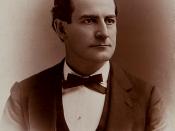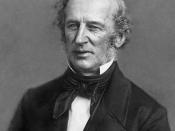The bitter controversy concerning the matter of the free coinage of silver is proving critical to where the votes will fall in this year's (1896) campaign. On one side, there is William Jennings Bryan who believes that the free coinage of silver is decisive if all the people of the United States wish to prosper from the wealth that it is generating. On the other hand, there is the Republican McKinley who deems that the U.S. must retain the gold standard if it is to cope with and engage in international trade, especially with Britain. Both parties are claiming that either the free coinage of silver (supported by Bryan) or the strict devotion to the gold standard( supported by McKinley) holds the key to the prosperity and honour of the nation. Contrary to the beliefs advocated by the Republican party the free coinage of silver can assist the people of the United States by increasing the money supply in times of depression, assisting the majority to clear their debts, and by relieving part of economic struggle faced by the majority as a result of the vast growth of industries, monopolies, and trusts().
The free coinage of silver can clear discontent and economic distress of farmers. These struggles were caused by the nation's shift from an agricultural American life to one in which is dominated by industry. The public feel as if they were being cheated by these "robber barons," a term given to those who took advantage of the middle and lower classes by "boldly stealing the fruits of their toils" (O'Neil). However, these corporate tycoons' conduct is legal. Cornelius Vanderbilt, a well-known railroad monopolist, once said, "Law! What do I care about the law? Hain't I got the power?" (O'Neil) The change from a farming nation to an industrial...


